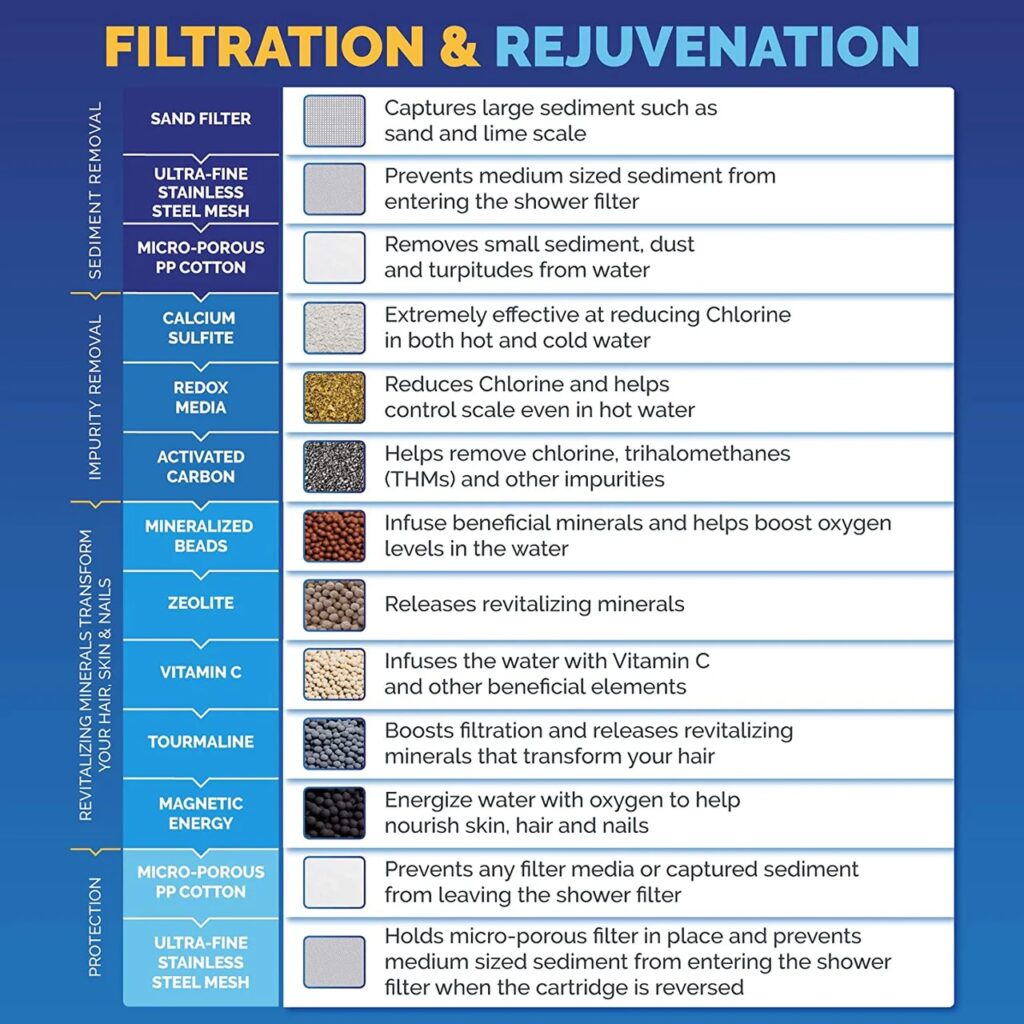Today we explore the different types of shower filters. This includes the filtration systems that various companies use and the different connection types that filters can have.
Let’s begin:
Types of Filtration Systems
Shower filters can work through a variety of mechanisms, but most can be classified into one of the following types based on how they remove impurities:
Vitamin C Shower Filters
Vitamin C shower filters use ascorbic acid to neutralize nearly all the chlorine (90%+) found within your water (source). However, chloramine is more stable, and any shower filter, including vitamin C, will be less effective at removing chloramine.
Vitamin C shower filters are also not as effective at removing heavy metals or other impurities. Go with this filter if you only want to remove chlorine and nothing else.
Kinetic Degradation Fluxion Shower Filters
A kinetic degradation fluxion, or KDF, a shower filter, is a type of water filter that uses a basic chemical process called redox (reaction oxidation-reduction) to remove chlorine from water (source).
KDF filters are made from various sized media granules made typically from high-purity copper-zinc alloy that creates an electrical charge as water passes through it.
Per WaterFilters.net, KDF filters work by the following method:
The KDF redox process works by exchanging electrons with contaminants which converts many contaminants into harmless components. Redox involves the transfer of electrons between two molecules which changes these molecules into different elements. The loss of electrons can change contaminants into less harmful, or even harmless, elements. Some harmful contaminants are electrochemically bound to the KDF media while others are converted to harmless components, such as chlorine to chloride.
https://www.waterfilters.net/kdf-water-filters.html
Aside from chlorine, KDF filters can remove other materials within your water, including heavy metals, iron, and hydrogen sulfide. Like all shower filters, KDF filters are still ineffective at removing chloramine.
Carbon-Based Shower Filters
A carbon-based shower filter is the most common type of filter. Carbon, also known as activated charcoal or activated carbon, is a natural material that effectively filters out impurities.
When water comes into contact with the carbon, certain contaminants are adsorbed onto the surface of the carbon granules. The longer the water is in contact with the carbon, the more impurities will be removed.
This filter can remove heavy metals and chlorine. For chloramine, the water must slowly go through the filter – making it not effective for chloramine.
Multistage Filtration Systems
Shower filters, such as those from AquaBliss, use several layers of filtration to remove impurities from your water. This can allow you to enjoy a more thorough cleanse, as each filtration stage is designed to remove different types of impurities and sediment.
For example, the SF100 offers the following filtration stages:

As you can see, the several filters will remove chlorine, trihalomethanes, fungi, and other volatile organic compounds (VOCs).
Proprietary Filtration Systems
Some companies, such as Sprite Showers, make their filtration systems such as Chlorgon. Chlorgon is a redox filtration system, similar to KDF filters, that converts harmful chemicals into harmless water-soluble compounds.
If you are uncertain which is right for you, we recommend reading about individual filtration systems on the company website to determine which filter types works for your water.
Types of Connections
There are a few ways you can filter water at the shower head. The main ways are inline, the shower head, and the water source.
Inline Shower Filter
This is the most common type of shower filter. The filter is installed in the water line between the shower head and arm – hence the name inline. Fortunately, your shower head and arm feature a 1/2″ NPT connection, a standard size for shower filters.
This type of shower filter allows you to enjoy the benefits of shower filtration while still using your existing shower head. Additionally, if you decide to move from your home or are in a rental unit, you can easily take the shower filter with you when you leave.
However, some of these filters can be unsightly as they often hang below the shower head. But they do allow you to easily replace the filters regularly.
Shower Head Filtration
Some shower heads will feature filters within the shower head itself. This type of shower head is less common but does have some advantages. The main advantage is that it’s an all-in-one solution – providing a seamless and sleek look in your shower. Additionally, it’s a great option if you’re looking for filtration on a budget.
However, this type of shower head does have some disadvantages. The first is that you’re stuck with the shower head that comes with the filter. So if you’re not a fan of the shower head, you’re out of luck.
The second disadvantage is that these types of shower heads are often less effective than inline or canister filters. This is because the filter must be small enough to fit inside the shower head, limiting the amount of contaminant removal that can occur.
Lastly, the filters within a shower head may be impossible to replace, requiring you to replace the entire shower head, which is both wasteful and labor-intensive.
Whole-Home Filtration
While not technically a shower filter, whole-home filtration is worth mentioning as it will provide you with filtered water at every faucet in your home – including the shower.
A whole-home filtration system is installed at the main water supply for your home and filters water as it enters your home. This means that every time you turn on the shower – or any faucet in your home – you’re getting filtered water.
The main disadvantages of whole-home filtration are the cost and the installation. Whole-home filtration systems can be expensive, particularly if you need to hire a professional to install them.
Additionally, because the system is installed at the main water line, it can disrupt your home during installation.
Common Questions
Will shower filters reduce odor?
Shower filters will not necessarily reduce odor. However, they will remove chlorine and other chemicals that can cause an odor. If there is a high concentration of sulfur and you rely on well water, a shower filter can help to reduce the unpleasant odor of rotten eggs.
Will shower filters prevent hard water?
No, shower filters will not prevent hard water. Instead a whole-home water softener will be required for that.
How often should filters be replaced?
This will depend on the type of shower filter you’re using and the quality of your water. Generally, most filters will need to be replaced once every 10,000 gallons, typically about 6 months for a family of four.
Do shower filters reduce water pressure?
No, shower filters will not reduce water pressure. They simply clean the water before it comes out of the shower head and won’t have any impact on the flow of water.
